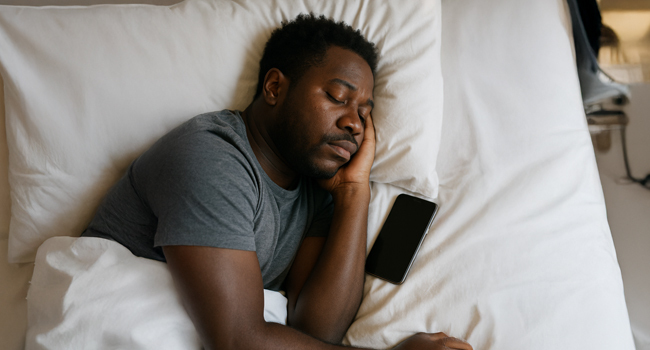Expert Warns Nigerians Against Sleeping With Phones

Akin Ibitoye, Technology Advisor at TMB Tech, has issued a strong warning to Nigerians about the health and safety hazards of sleeping with mobile devices under pillows or near beds, emphasizing the dangers that range from disrupted sleep cycles to potential fire outbreaks caused by overheating batteries.
Speaking during an appearance on the Morning Brief on Channels Television on Monday, Ibitoye cautioned against the increasingly common habit of keeping smartphones close during bedtime, stressing that mobile gadgets are not as harmless as they seem, especially when used inappropriately.
“Do not sleep with your gadget under your pillow,” Ibitoye warned. “When you sleep with your devices under your pillow, it actually affects you. You don’t know.”
He explained that while many people are aware of the negative impact of blue light emissions on sleep, few consider the other risks such as the disruption of circadian rhythm — the body’s internal biological clock that regulates sleep-wake cycles.
This interference, he said, can lead to poor sleep quality, increased stress levels, and irritability.
“These gadgets disrupt our circadian rhythm. That’s how, when it’s dark, your body gets the signal it needs to sleep,” he noted. “When you don’t get enough sleep, there are quite a number of things that even medical practitioners have said could result negatively back to your body.”
Highlighting psychological risks, Ibitoye pointed to the growing problem of “doomscrolling,” a behavior where individuals intend to check social media briefly but end up spending hours scrolling, leading to late nights and poor mental health.
“We spoke about doom scrolling, where you just want to check Instagram for about five minutes, but you end up spending two hours,” he lamented.
He urged Nigerians to consider returning to traditional alarm clocks instead of relying on mobile phones, which, he said, cause unnecessary distractions at night through pop-ups, alerts, and vibrations.
“Before mobile phones, we had alarm clocks. The alarm clock would only sound when the time is right,” Ibitoye said. “Phones, on the other hand, bombard us with distractions.”
Beyond the issue of sleep, Ibitoye raised concerns over the physical dangers posed by smartphones, particularly the risk of overheating and fire. He referenced several past incidents, including a viral video of a woman whose phone exploded while she was on a call, to illustrate the risks of placing devices under pillows or bed covers.
“These batteries, lithium-ion batteries, you notice they don’t allow them on airplanes for good reasons,” he explained. “This tiny marvel of technology can explode anytime. If you keep your phone under your pillow, your phone actually gets heated up.”
He also pointed to the often-overlooked issue of electromagnetic radiation, explaining that even when a phone appears idle or off, it can still send and receive signals that may interfere with brain activity.
“These electromagnetic devices being so close actually affect the electrical signals in our brain,” he said, recommending that people use wired or wireless earphones and keep their phones away from their heads, especially during sleep.
For those who say they need their phones close due to work or emergencies, Ibitoye said unless the phone is essential to one’s job, it should be kept away at night. As a practical alternative, he advised using airplane mode to minimize electromagnetic emissions while retaining alarm functions.
“If you cannot afford to switch it off, put it in airplane mode,” he advised. “No call will come in, no SMS, no notification, but your alarm will still go off.
Ibitoye concluded with a sobering reminder: “As ubiquitous as technology is, it can be harmful to our bodies with extended usage.”
The warning adds to growing global concerns about the impact of digital devices on human health and well-being, especially in a world where smartphones have become an inseparable part of daily life.
